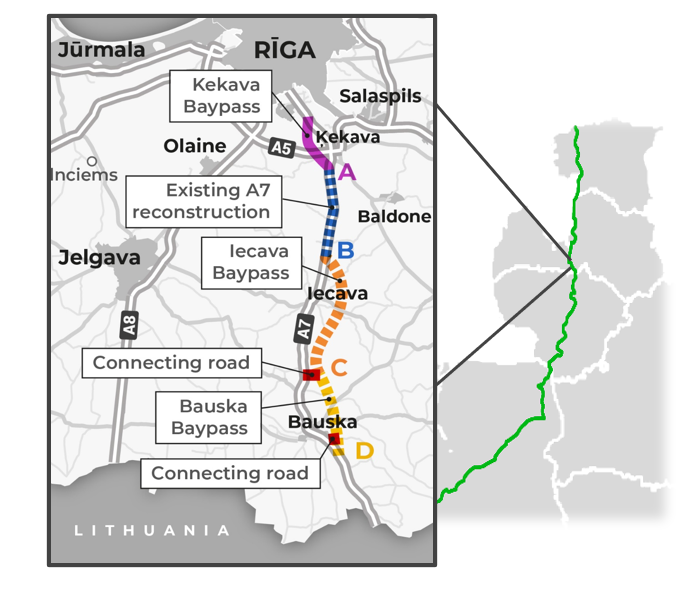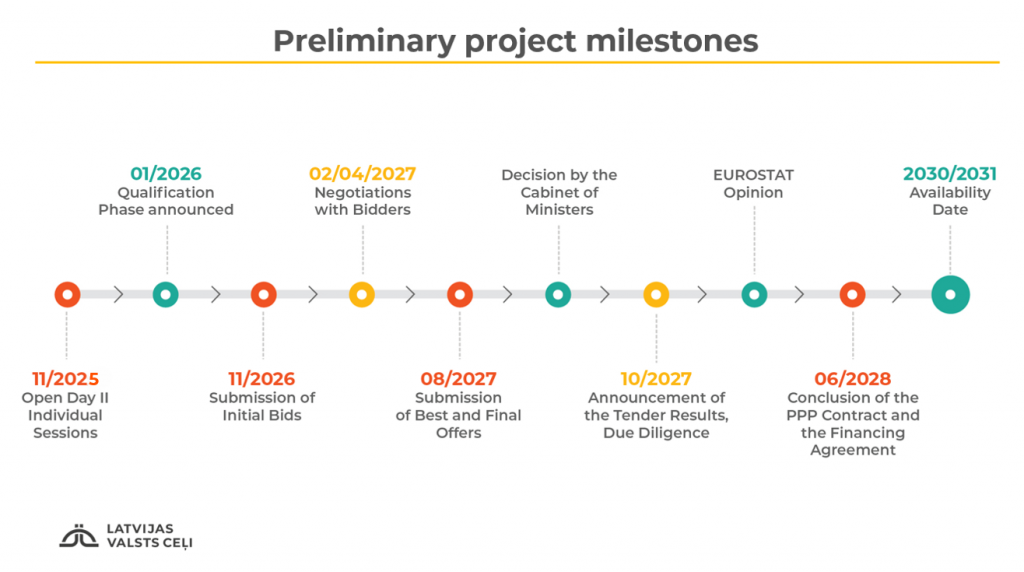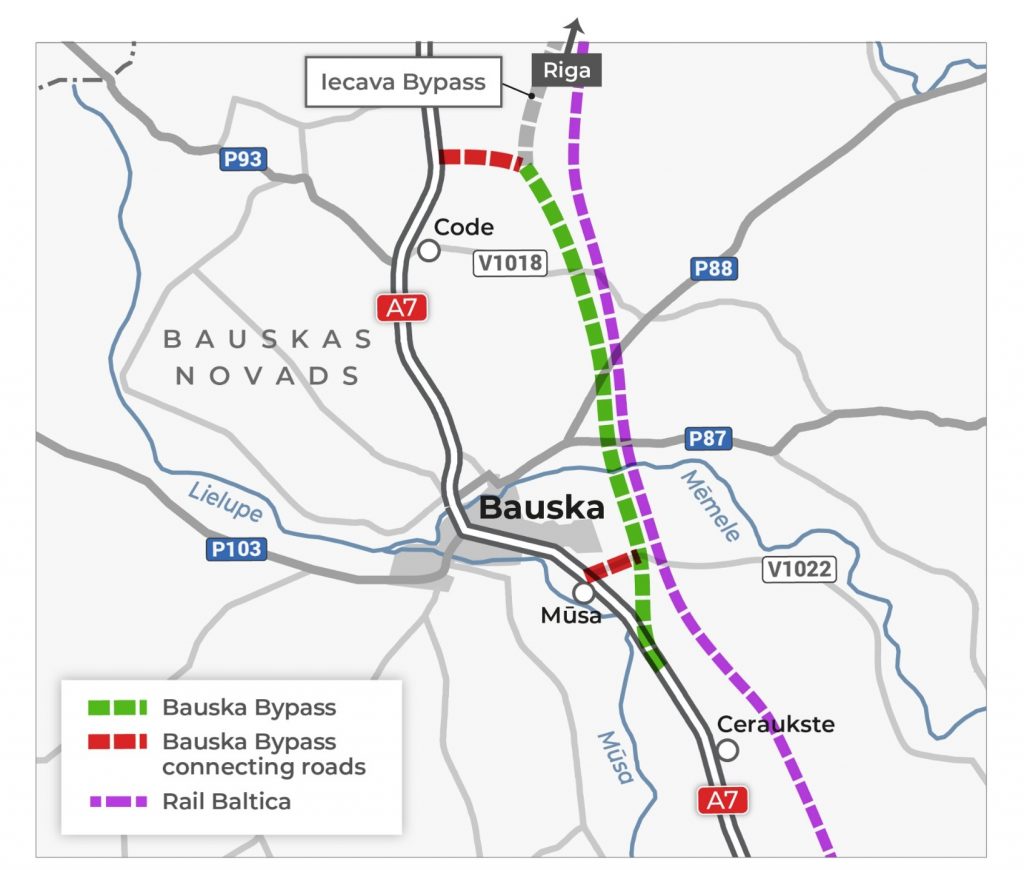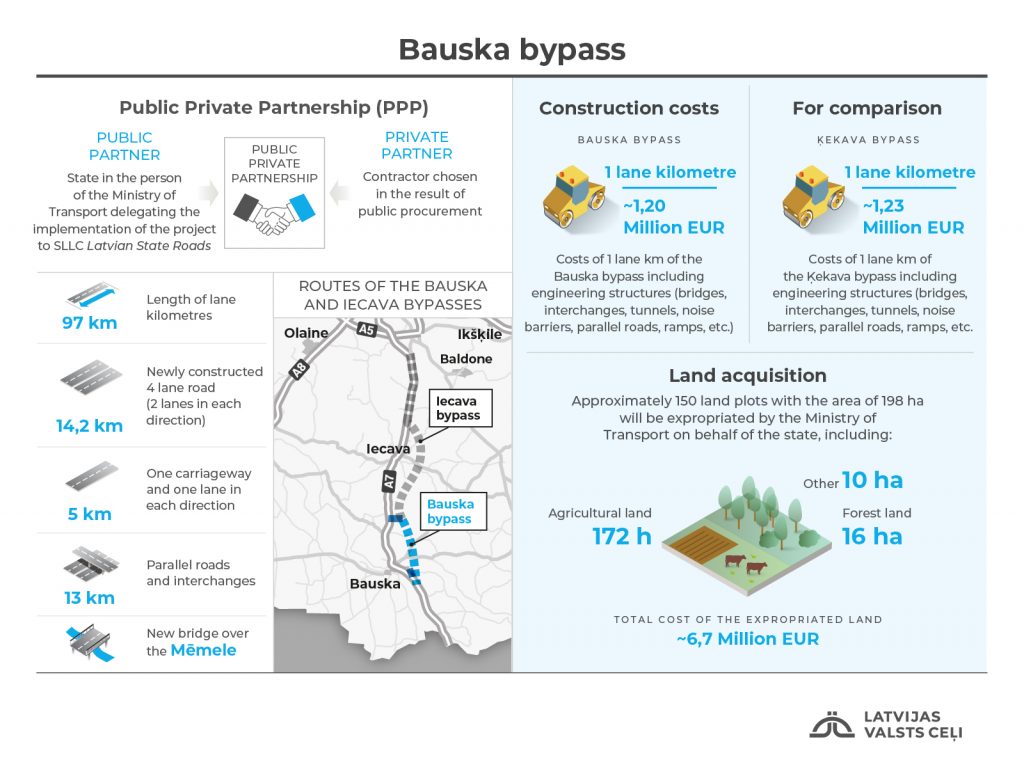Bauska Bypass
On 14 June 2024, the Cabinet of Ministers issued an order initiating the implementation of phase 1 of the reconstruction project (the Project) of the main state road A7 Riga–Bauska–Lithuanian border (Grenctāle), covering the section from the Kekava Bypass to Bauska (Ārce), under the public–private partnership (PPP) model. In accordance with the order, the Project is divided into two phases: in the first phase, the Bauska Bypass will be constructed, while the second phase will include the Iecava Bypass and the section connecting it to the Kekava Bypass (see the drawing below)

The order of the Cabinet of Ministers also provides for the commencement of land acquisition for the construction needs of both the Bauska and Iecava bypasses and grants the status of an object of national interest to the infrastructure of both bypasses.
The text of the order of the Cabinet of Ministers On the initiation of the public-private partnership procedure for phase 1 Bauska Bypass of the reconstruction project of the main state road A7 Riga–Bauska–Lithuanian border (Grenctāle), section from the Kekava Bypass to Bauska (Ārce), the acquisition of immovable property for phase 2 Iecava Bypass of the Project, and the designation of the infrastructure of the Bauska and Iecava bypasses as an object of national interest is available here.
In order to improve traffic along the international motorway Via Baltica – which in Latvia comprises f the Tallinn motorway (A1) and the Bauska motorway (A7) – in 2023, traffic was opened on the newly constructed Kekava Bypass, implemented as a PPP project. To further improve the Latvian section of Via Baltica, it is necessary to reconstruct the Riga Bypass, construct the Iecava and Bauska bypasses, and build the road sections that connect all three bypasses, as well as to construct a connection betweenthe Riga Bypass and the Bauska motorway following the construction of a new dual bridge over the Daugava River. By the order of the Cabinet of Ministers the Ministry of Transport (MoT) has been instructed to initiate the PPP procedure. In accordance with the delegation agreement between the MoT and State Limited Liability Company Latvian State Roads (LSR), the PPP procedure will be carried out by LSR. The planned timeline for the Bauska Bypass PPP project foresees that, immediately following the issuance of the order, land acquisition for the construction of the bypass will begin. During 2025, the PPP procurement documentation for the Bauska Bypass will be prepared. The PPP procurement is planned to be announced at the beginning of 2026 with the PPP contract expected to be concluded in the first half of 2028. The design and construction of the Bauska Bypass are planned to take place between 2028 and 2030/2031.

Infrastructure of the Bauska Bypass
The main alignment of the Bauska Bypass will be a newly constructed road with a total length of 14.2 km. It is planned to have two lanes in each direction. The Bauska Bypass alignment will include the construction of a new bridge over the Mēmele River, grade–separated interchanges, overpasses, and multi-level pedestrian and cyclist crossings, the exact number of which will be specified during the design process. Certain existing local roads will be reconstructed, and new access roads will be built with a total length of approximately 13 km. In addition, two connections – near Code and near Bauska – with the existing A7 main alignment will be constructed, each approximately 2.5 km in length.

Costs of the Bauska Bypass
As in the case of the Kekava Bypass, the private partner of the Bauska Bypass project will also be responsible for attracting financing for the implementation of the project, as well as for the design, construction, and maintenance of the road for 20 years following the completion of construction. Construction supervision will be carried out by a construction supervisor engaged by LSR.
The planned costs of the Bauska Bypass project over a 23-year period – including design, construction, financing, daily road maintenance, and periodic maintenance – is estimated at approximately 300 million euros. The exact contract amount will be determined upon the conclusion of the PPP procurement procedure, at the moment of signing the PPP contract. It will be recalculated in accordance with the procedure specified in the tender documentation, taking into account the interbank offered rate (Euribor) and the interest rate swap applicable at the moment of signing the PPP contract.
During the design and construction phases, the state will not make any payments. All investments will be made by the private partner. Once construction is fully completed, the quality of the works has been confirmed as compliant with regulatory requirements, and the infrastructure is available for public use, the state will begin making availability payments to the private partner – gradually, over a 20-year period, fully settling the agreed amount for the completed works.
The availability payment is the PPP contract amount agreed upon by the parties at the time of signing the partnership agreement.
The availability payment covers the private partner’s expenses for design, construction, daily maintenance, and periodic maintenance over a 20-year period following the completion of construction works, as well as costs related to financing, insurance, administration, and other expenses. The total availability payment specified in the PPP agreement represents the maximum possible amount that the private partner may receive during the term of the PPP contract.

By implementing the Bauska Bypass project as a PPP, it is planned that potential cash flows will be considered as off-balance sheet liabilities and will not have a negative impact on the general state budget balance and debt.
Why the Bauska Bypass?
The Bauska and Iecava bypasses are part of the core network of the European transport network (hereinafter – TEN-T) and the road transport corridor Via Baltica from Tallinn to Warsaw. These sections are important not only for Latvia but also for the flow of international passenger and freight traffic, as well as military mobility between the Baltic States and other European Union countries in the north–south direction.
Currently, the loading on the Bauska motorway (A7) section from the Kekava Bypass to Iecava has reached 115%, which is considered critical. In sections from Iecava to Bauska and from Bauska to the Lithuanian border, the loading is close to 100% and is expected to exceed it in the coming years. A significant share of the trafficis freight transport – Via Baltica is the busiest transit road in Latvia. At present, the Bauska motorway (A7) has only one section with separated carriageways and two lanes in each direction – the Kekava Bypass. The remaining section of the motorway does not meet the requirements for safe and convenient traffic, nor the standards set by the TEN-T Regulation.
Given the negative impact that intensive transit traffic has on the urban environment and residents of Bauska, the project has been divided into phases, with the Bauska Bypass planned as the first phase.
Why PPP?
A PPP project can be compared to a family’s decision to buy an apartment by taking out a loan. Similar to a mortgage, the PPP model allows the state to “purchase” a road on an instalment basis -with no payments made during the initial years while construction is ongoing, and repayment of both the principal and interest starting only after construction is completed, over a period of 20 years. This approach enables the road to be built now and paid for later, without placing an immediate burden on the state budget or the fiscal space. It also allows for the implementation of other important national projects at the same time – something that would not be possible if the full cost of the bypass had to be covered upfront and directly from the state budget.
OPEN DAYS MATERIALS
Information Day I Q&A Summary (Word)
Information Day I Q&A Summary (PDF)
Information Day II Presentation (PPT)
Information Day II Q&A Summary (PDF)
PARTICIPANTS PRESENTATIONS
Bauska Bypass PPP project financial aspects
EIB Corporate presentation Bauska PPP
Roads Public Private Partnerships Overview in Europe and in the Latvian context
*Disclaimer on the published information
Materials published in this section of the Latvian State Roads website, a state-owned limited liability company (hereinafter – Latvian State Roads), contain information that may assist interested suppliers in preparing for the
upcoming public procurement procedure for selecting a private partner to implement the Bauska Bypass PPP project.
Materials are published for informational purposes only. None of them constitutes a promise or guarantee regarding their compliance with, or relation to, the planned public procurement and the Bauska Bypass PPP project. When preparing the draft Bauska Bypass PPP Contract, Latvian State Roads, at its sole discretion, will apply selected principles, approaches, and solutions from the Kekava Bypass PPP Contract, adapting or supplementing them as needed.
No one shall have any right to rely on or refer to these materials, nor to request their use or incorporation into the planned public procurement or the Bauska Bypass PPP project. The Kekava Bypass PPP Contract published herein shall not be deemed, and does not constitute, an integral part of the potential public procurement for the Bauska Bypass PPP project.
None of these materials imposes any mandatory obligation on Latvian State Roads to announce or implement the public procurement and/or the Bauska Bypass PPP project, including considering or basing it on these materials. Latvian State Roads assumes no liability and provides no promises or guarantees regarding the contents of these materials. Latvian State Roads is under no obligation to prepare the Bauska Bypass PPP Contract by fully replicating the Kekava Bypass PPP Contract.
Link to the Kekava Bypass PPP Contract: https://lvceli.lv/celu-tikls/iepirkumi/ligumi/
Kekava Bypass PPP Project Selection Procurement Document 2018
In relation to the Bauska Bypass PPP project, Latvian State Roads publishes below two variants of the building design in minimum composition (the DMC), which may serve as a basis for issuing a construction permit.
The DMC variants are published for informational purposes only. None of them shall be deemed or construed as a promise or guarantee that either will form the basis for the construction permit for the Bauska Bypass. Latvian State Roads reserves the right, at its sole discretion, to refine either of the two DMC variants or to develop an alternative DMC variant.
Until the announcement of the public procurement for selecting a private partner for the implementation of the Bauska Bypass PPP project, any potential changes to the DMC will be published on this webpage. During the procurement process, candidates or bidders will be notified of any applicable changes to the DMC.
These disclaimers supplement—but do not override—any general disclaimers applicable to all materials published in this Bauska Bypass PPP project section of the Latvian State Roads website.